4. Deployment Pipeline Modeling Overview
This topic describes how you use the Harness Continuous Delivery Abstraction Model.
How do I model my CD practices in Harness?
Continuous Delivery is modeled using Pipelines and Stages.
In each Stage, you define what you want to deploy using Services, where you want to deploy it using Environments, and how you want to deploy it using Execution steps.
For example, a Service uses your Kubernetes manifests and Docker image, an Environment connects to your dev cluster, and Harness automatically generates an Execution using a Rolling Deployment step.
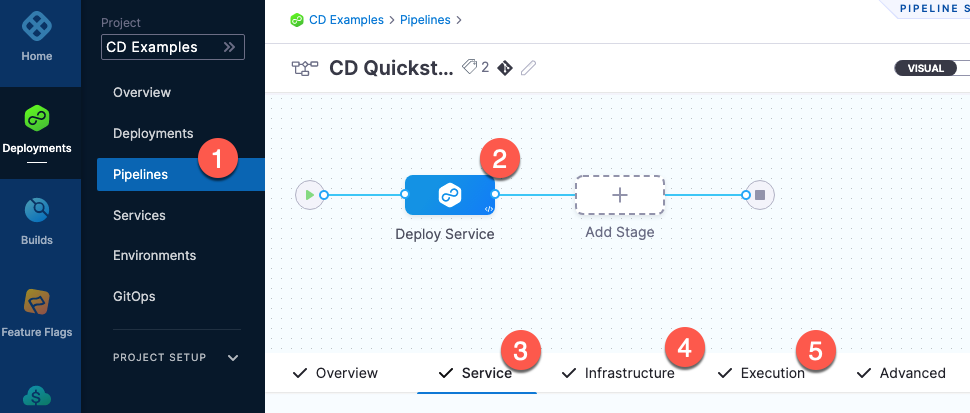
The image above shows you the order for modeling a CD stage:
- Create a pipeline.
- Add a CD stage.
- Define a service.
- Target an environment and infrastructure.
- Select execution steps.
You can model visually, using code, or via the REST API.
Pipeline Studio (Visual)
Model your process visually using a guided sequence:
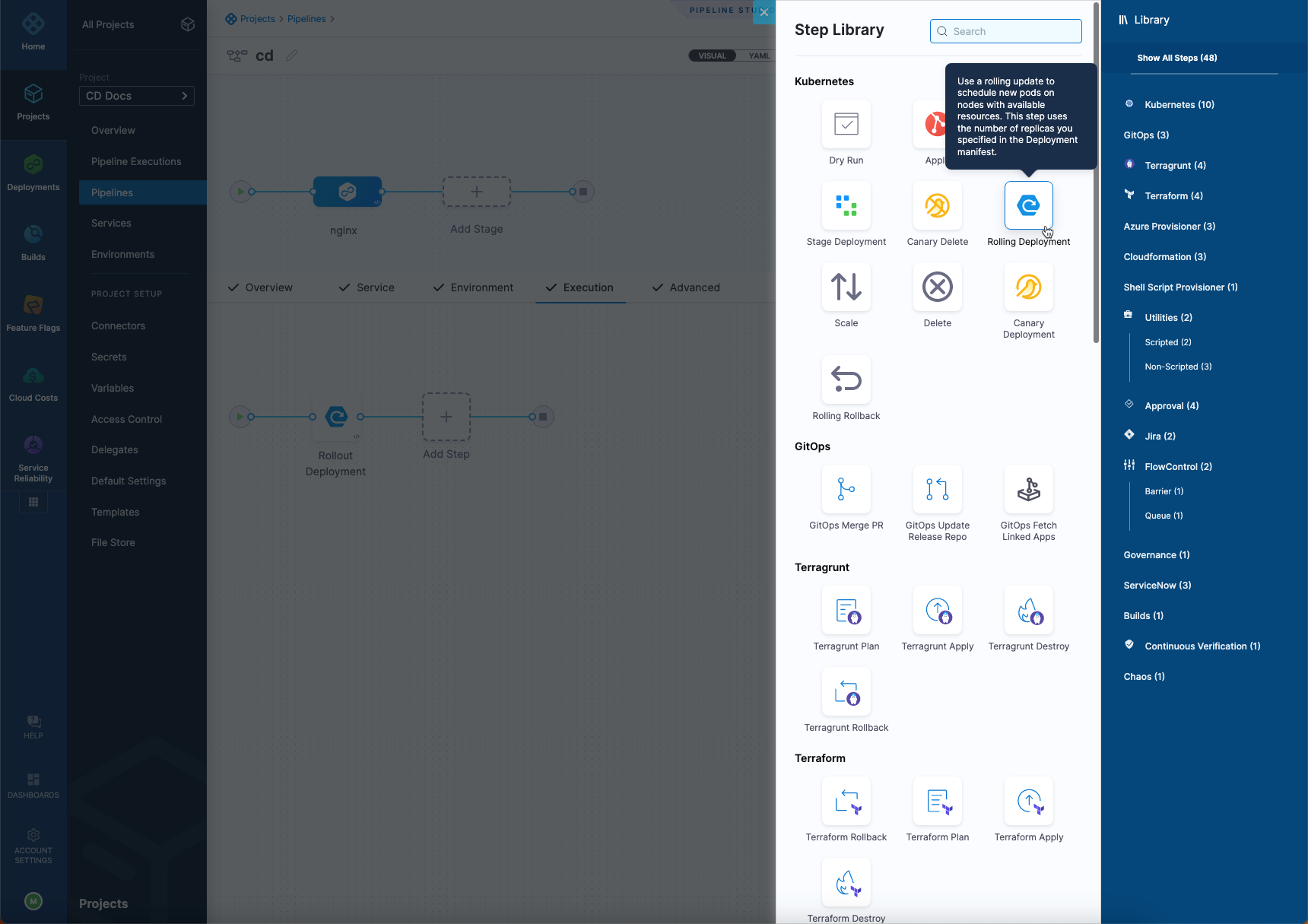
YAML Builder
Model your process in code using a full-featured YAML editor:
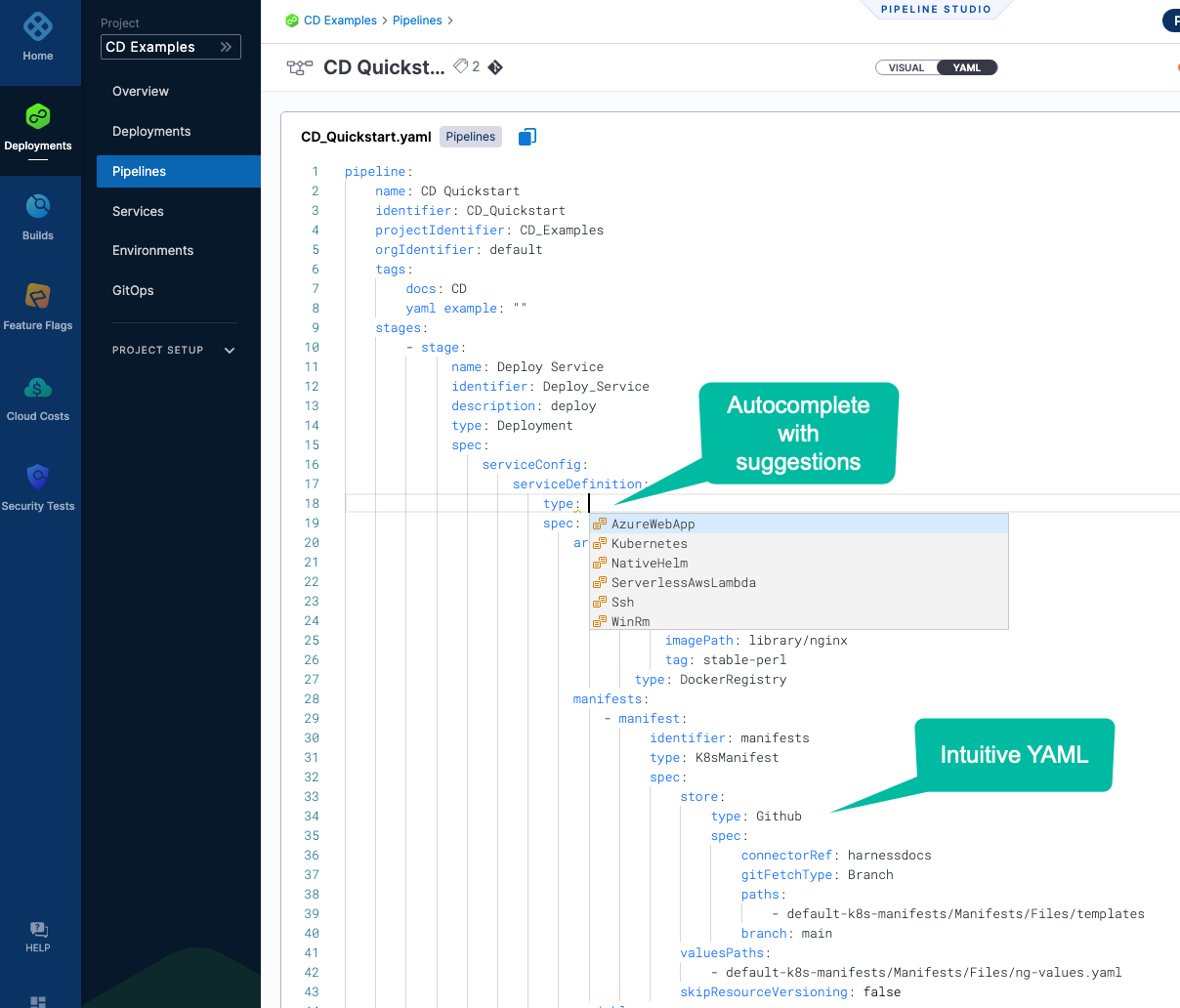
For more details, go to Write pipelines in YAML.
REST API
Model your process using a full-featured REST API:
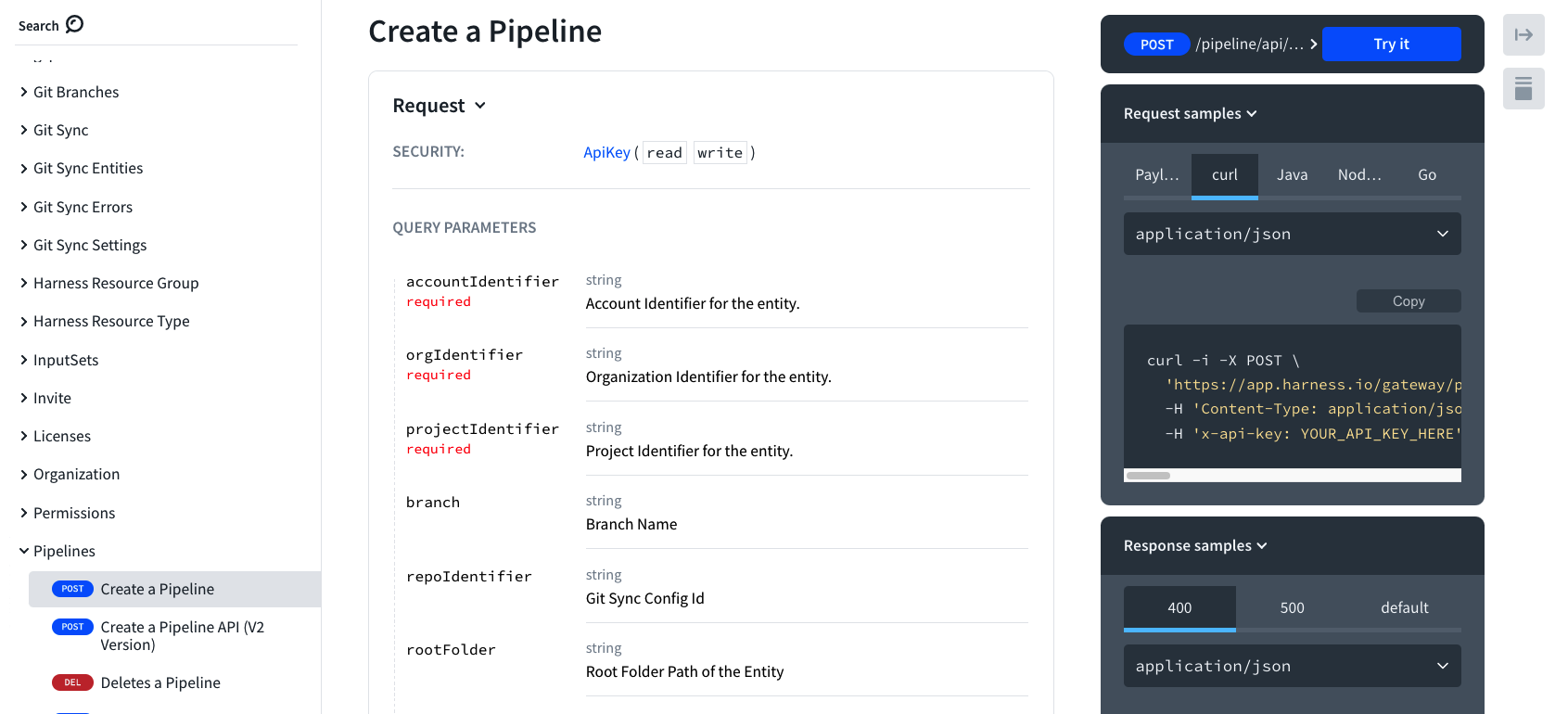
For more details, go to Get started with Harness APIs.
How do I automate my CD process in Harness?
Harness Continuous Delivery provides Triggers for automating the execution of Pipelines, multiple settings for adding conditions to how the Pipeline executes and rolls back, and Approvals to ensure that the Pipeline only proceeds when safe to do so.
Triggers
Automate the execution of a Pipeline in response to changes in manifests/specs, artifacts, or on a schedule:
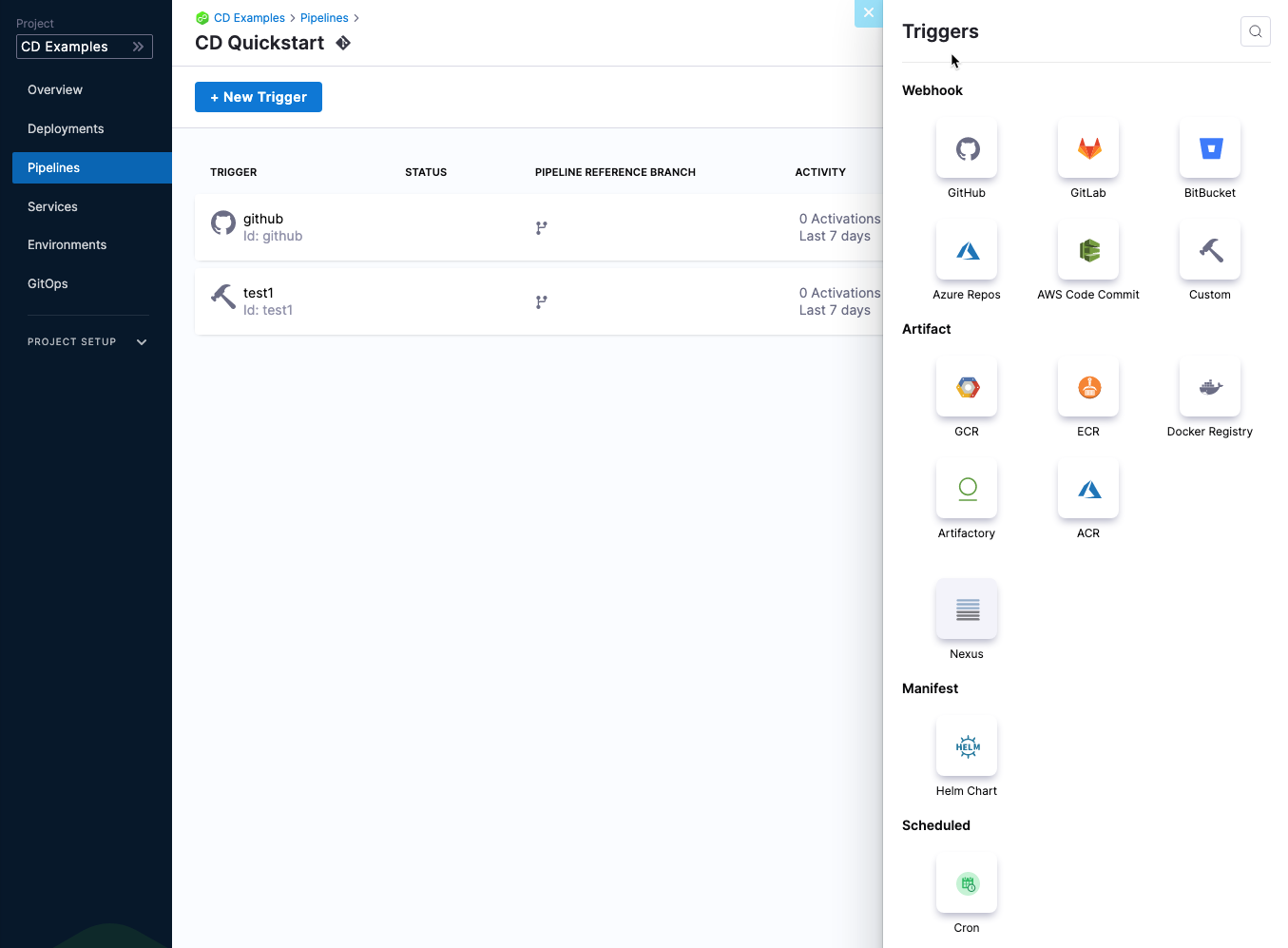
For more details, go to Triggers.
Conditions
Set when, if, and how a Stage executes and what to do if it fails:
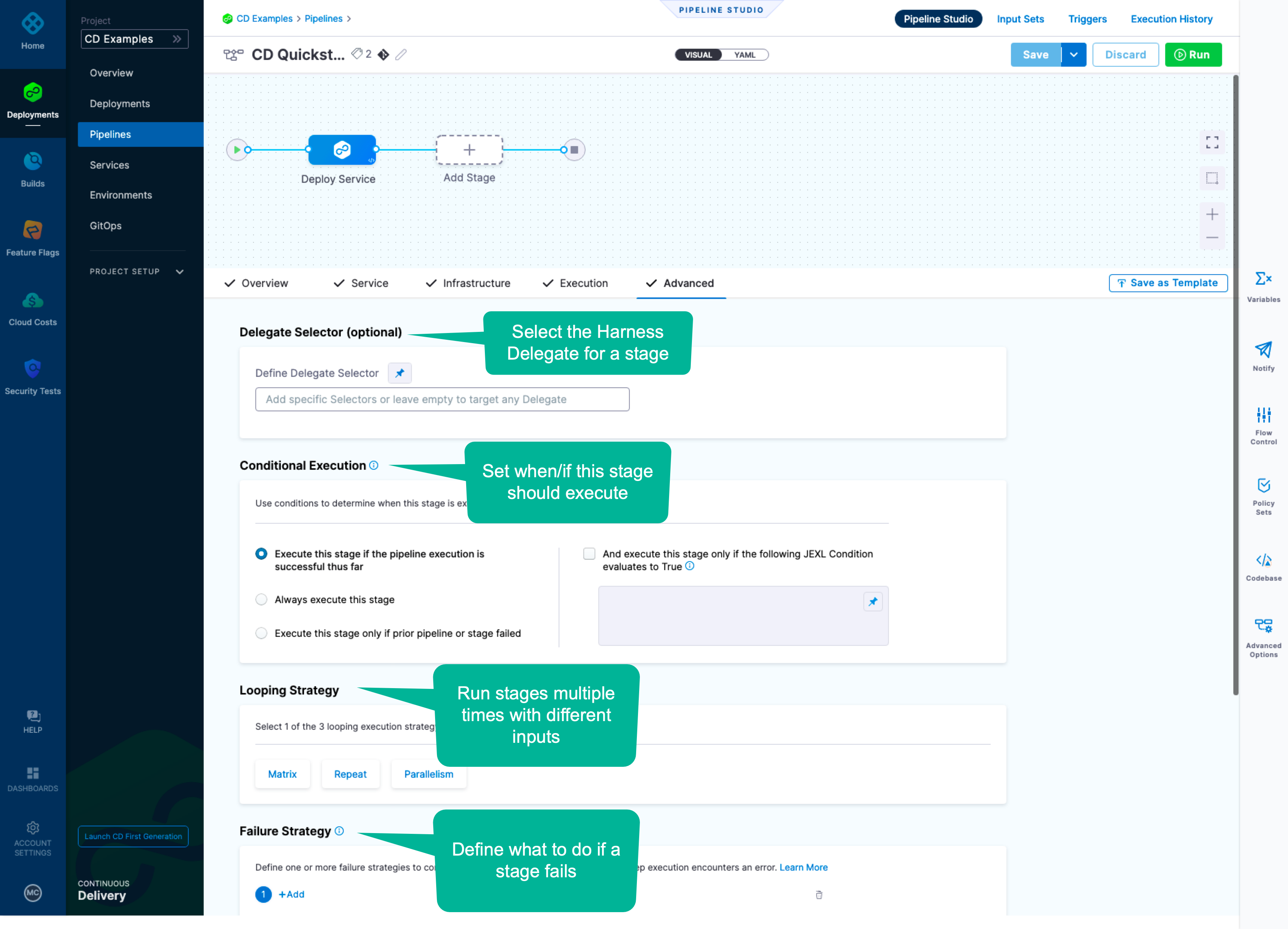
For more details, go to Define conditional executions for stages and steps.
Approvals
Add checks at any point in your process to ensure that deployments are safe:
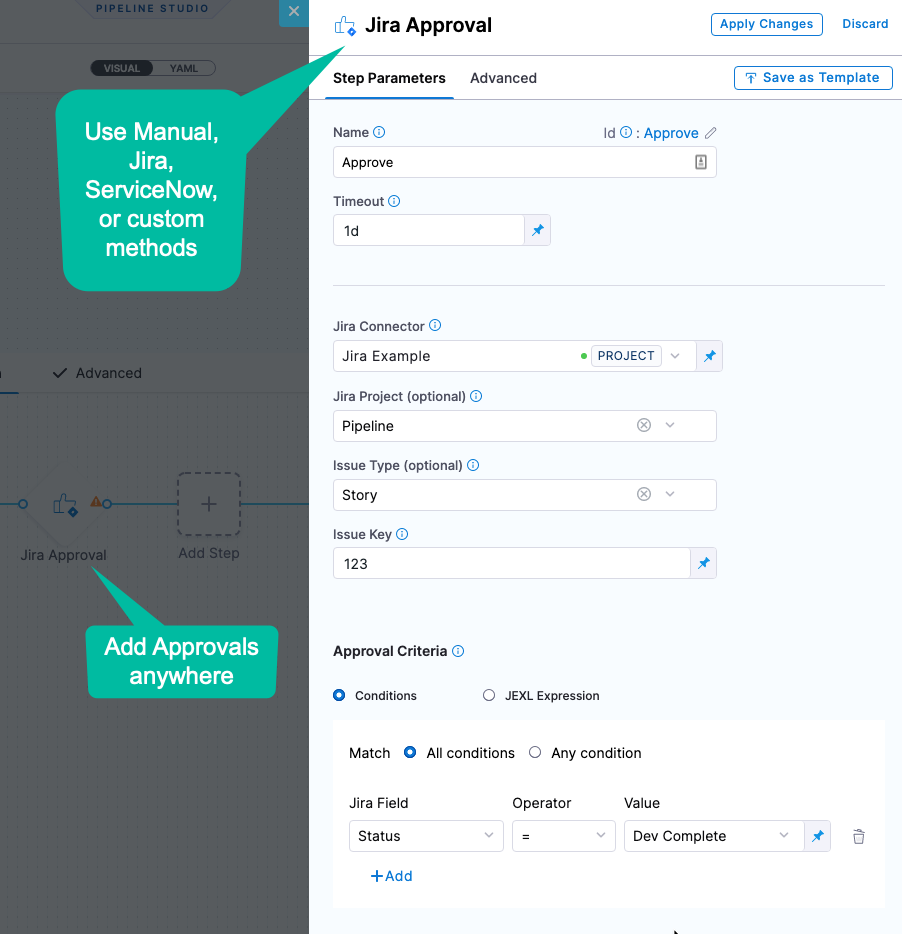
For more details, go to Approvals.
Verification
Harness' Continuous Verification (CV) approach simplifies verification.
Harness CV integrates with your APMs and logging tools to:
- Verify that the deployed service is running safely and perform automatic rollbacks.
- Apply machine learning to every deployment to identify and flag anomalies in future deployments.
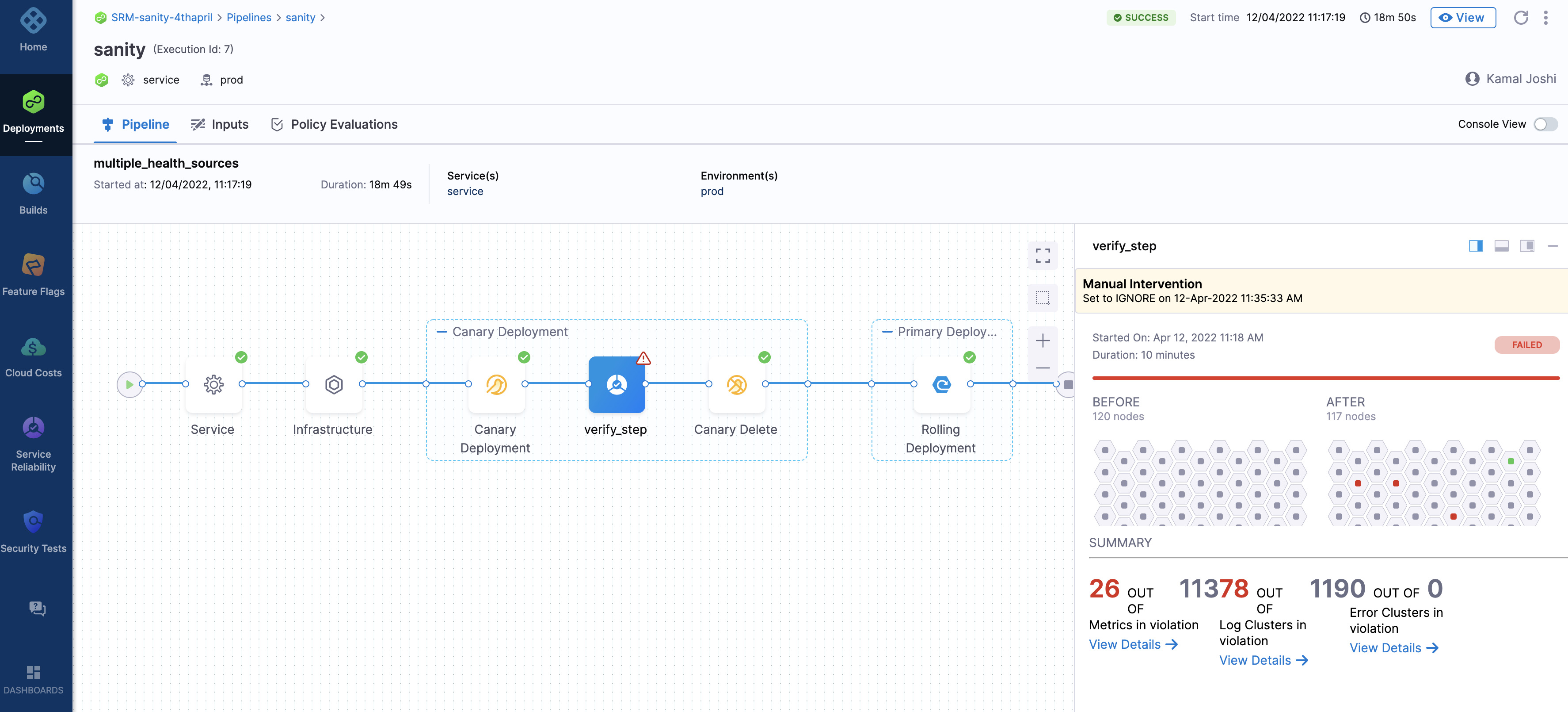
For more details, go to Verify Deployments with the Verify Step.
Summary
This topic provided a high-level overview of how you can model your software delivery process in Harness Continuous Delivery Pipelines and Stages.
For more details and examples, go to:
- CD tutorials
- CD overview and key concepts
- Service-based licensing and usage for CD
- Deployment concepts and strategies
How Harness Models it's Pipelines?
Mastering Continuous Delivery: A Closer Look at How Harness Engineers Deploy Software from Harness highlights their journey towards optimizing their Continuous Delivery (CD) pipelines. They address challenges like migration complexities, pipeline management issues, and the lack of standardization across services. By introducing a simplified, unified "Golden K8s Pipeline," integrating version control through GitHub, and adopting a uniform deployment process, Harness streamlined its deployment strategies. These changes resulted in significant benefits such as enhanced collaboration, consistent deployment practices, and automated workflows, paving the way for further advancements like adopting Helm Charts for better scalability and simplification.
Demo Video
Pipeline Template
This YAML describes a pipeline configuration for deploying Kubernetes (K8s) services using a template named "Golden_K8s." The pipeline, designated as "Golden Harness K8s Deployment," is structured for deploying services across various environments, including QA, production, and UAT, while ensuring deployment on both primary and failover infrastructures. It incorporates steps for prerequisite checks, applying Kubernetes resources, and post-deployment actions, which may involve updating Jira. The configuration also allows for specifying variables related to deployment types, environments, and integration points such as webhooks, sign-off pages, and Git details, emphasizing flexibility and control in deployment processes.
pipeline:
name: Golden Harness K8s Deployment
identifier: Golden_Harness_K8s_Deployment
projectIdentifier: Operations
orgIdentifier: Harness
description: This pipeline is based on a golden stage template to be used for k8s deployment of services. This will implicitly take care of deploying the image on both primary & failover infrastructures. This will handle environments of type qa,qafree,prod1(prod),prod2(free),prod3(compliance) & uat.
tags:
golden: ""
ops_owned: ""
regulated: ""
stages:
- stage:
name: deploy_service
identifier: deploy_service
template:
templateRef: Golden_K8s
templateInputs:
type: Deployment
spec:
services:
values: <+input>
environments:
values: <+input>
execution:
steps:
- stepGroup:
identifier: pre_requisite
steps:
- step:
identifier: get_deployed_version
template:
templateInputs:
type: ShellScript
spec:
environmentVariables:
- name: deploymentName
type: String
value: <+input>
- name: versionedNs
type: String
value: <+input>
- name: isStatefulSet
type: String
value: <+input>
- step:
identifier: hpa
type: K8sApply
when:
condition: <+input>
- stepGroup:
identifier: post_steps_primary
steps:
- parallel:
- step:
identifier: mark_jira_deployed
type: ShellScript
spec:
source:
type: Inline
spec:
script: <+input>.default("Please fill in if applicable script here")
when:
condition: <+input>
variables:
- name: ChangeList
type: String
value: <+input>
- name: QASignOffPage
type: String
value: <+input>
- name: DeploymentType
type: String
value: <+input>.allowedValues(new-rel,hf-feature,hf-regression,rollback,bounce)
- name: If_Regression_Choose_TicketPriority
type: String
value: <+input>.allowedValues(P0,P1,NA)
- name: sanity_urls
type: String
value: <+input>
- name: WEBHOOK_LIST_COMMA_SEP
type: String
value: <+input>
variables:
- name: envType
type: String
description: ""
value: <+env.identifier>
- name: availabilityType
type: String
description: ""
value: <+stage.spec.execution.steps.pre_requisite.steps.set_availability_type.output.outputVariables.infraType>
- name: gitConnector
type: String
description: ""
value: <+env.variables.gitConnector>
- name: branchName
type: String
description: ""
value: <+env.variables.branchName>
- name: ENABLE_COVERAGE
type: String
default: "false"
description: ""
value: <+input>.allowedValues(true,false)
delegateSelectors:
- <+env.variables.delegate>
Stage Template
The YAML outlines a detailed stage template named "Golden K8s" for deploying Kubernetes services, incorporating various steps to ensure robust and regulated deployments. It checks environmental prerequisites, verifies QA deployments, sets deployment-specific parameters, and includes security scans, mandatory validation, and approval steps. The template also manages notifications, sanity checks post-deployment, and has provisions for rollback in case of failure. This structured approach emphasizes thoroughness, security, and compliance, tailored for diverse environments including production and QA.
template:
name: "Golden K8s "
identifier: Golden_K8s
type: Stage
projectIdentifier: Operations
orgIdentifier: Harness
tags:
regulated: ""
ops_owned: ""
bt_managed: ""
spec:
type: Deployment
spec:
deploymentType: Kubernetes
services:
values: <+input>
metadata:
parallel: true
environments:
metadata:
parallel: false
values: <+input>
execution:
steps:
- stepGroup:
name: PRE_REQUISITE
identifier: pre_requisite
steps:
- step:
type: ShellScript
name: Check_namespace_env_mapping
identifier: Check_namespace_env_mapping
spec:
shell: Bash
onDelegate: true
source:
type: Inline
spec:
script: |-
set -x
if [ "<+infra.namespace>" == "NOT_SET_CHECK_WITH_SRE" ]
then
echo " Error!! For the current Env: <+env.name> is not mapped a namespace, as it not an existing deployment"
exit 1
fi
environmentVariables: []
outputVariables: []
timeout: 10m
when:
stageStatus: Success
failureStrategies: []
- step:
type: Http
name: check_image_deployed_in_qa
identifier: check_image_deployed_in_qa
spec:
url: https://stage.harness.io/gateway/pipeline/api/pipelines/execution/summary?routingId=wFHXHD0RRQWoO8tIZT5YVw&accountIdentifier=wFHXHD0RRQWoO8tIZT5YVw&projectIdentifier=Operations&orgIdentifier=Harness&page=0&size=100&sort=startTs%2CDESC&module=cd
method: POST
headers:
- key: x-api-key
value: <+secrets.getValue('qa_image_check_token')>
- key: content-type
value: application/json
outputVariables:
- name: qaLastStatus
value: <+json.select("data.content[0].status",httpResponseBody)>
type: String
requestBody: "{ \"moduleProperties\": { \"cd\": { \"serviceIdentifiers\": \"<+service.identifier>\", \"artifactDisplayNames\": \"<+artifacts.primary.imagePath>:<+artifacts.primary.tag>\", \"envIdentifiers\": \"qa\" } }, \"filterType\": \"PipelineExecution\"}"
assertion: <+json.select("data.content[0].status",httpResponseBody)>=='Success' || <+json.select("data.content[0].status",httpResponseBody)>=='IgnoreFailed'
timeout: 30s
when:
stageStatus: Success
condition: <+env.type> == "NA"
failureStrategies: []
- step:
type: ShellScript
name: set_availability_type
identifier: set_availability_type
spec:
shell: Bash
onDelegate: true
source:
type: Inline
spec:
script: "#!/bin/bash\n##########################################################\n# To set the Availability Type to primary or failover\n# based on the Infra Connector type\n##########################################################\nset -x\navailType=\"NULL\"\necho \" Connector : <+infra.connectorRef> \"\ncase <+infra.connectorRef> in\n\tqaprivate|prodprivateprimary|freeprivateprimary|compprivateprimary|uatprivate|qastress|genai_qa_k8s|genai_prod_k8s|prodcidlite|proddliteselfmanaged) availType=\"primary\" \n\t;;\n\tprodprivatefailover|freeprivatefailover|compprivatefailover|uatfailoverprivate|prodcidlitefailover) availType=\"failover\"\n\t;;\nesac\n\nif [ \"$availType\" == \"NULL\" ]\nthen\n echo \"availType cannot be NULL\"\n exit 1\nfi \necho \"Availability Type: $availType\""
environmentVariables: []
outputVariables:
- name: infraType
type: String
value: availType
timeout: 10m
- step:
name: get_deployed_version
identifier: get_deployed_version
template:
templateRef: Get_Deployed_Version
versionLabel: v2
templateInputs:
type: ShellScript
spec:
environmentVariables:
- name: deploymentName
type: String
value: <+input>
- name: versionedNs
type: String
value: <+input>
- name: isStatefulSet
type: String
value: <+input>
- stepGroup:
name: MANDATORY
identifier: mandatory
steps:
- step:
type: ShellScript
name: validate_inputs
identifier: validate_inputs
spec:
shell: Bash
onDelegate: true
source:
type: Inline
spec:
script: |+
set -x
change_list=$(echo <+stage.variables.ChangeList> | sed -e 's/null//' | sed -e 's/ //g')
if [[ -z ${change_list} ]]
then
echo "Mandatory pipeline variable: ChangeList is empty."
exit 1
fi
environmentVariables: []
outputVariables: []
timeout: 10m
when:
stageStatus: Success
condition: <+env.type> == "Production"
failureStrategies: []
- stepGroup:
name: STO_SCAN
identifier: STO_SCAN
steps:
- step:
type: Http
name: trig_sto_scan_pipeline
identifier: trig_sto_scan_pipeline
spec:
url: https://stage.harness.io/pipeline/api/webhook/custom/v2?accountIdentifier=wFHXHD0RRQWoO8tIZT5YVw&orgIdentifier=Harness&projectIdentifier=Operations&pipelineIdentifier=STO_scan_for_svc_artifact&triggerIdentifier=goldenPipelineTrigger
method: POST
headers:
- key: Content-Type
value: application/json
- key: X-Api-Key
value: <+secrets.getValue("failover_sa_token")>
outputVariables:
- name: apiUrl
value: <+json.object(httpResponseBody).data.apiUrl>
type: String
requestBody: "{\"imagePath\": \"<+artifact.imagePath>\",\"tag\": \"<+artifact.tag>\"}"
assertion: httpResponseCode == 200
timeout: 10s
when:
stageStatus: Success
condition: <+env.identifier> == "qa"
failureStrategies: []
- step:
type: Http
name: poll_scan_status
identifier: poll_scan_status
spec:
method: GET
headers:
- key: Content-Type
value: application/json
outputVariables:
- name: pollingStatus
value: <+json.object(httpResponseBody).data.executionDetails.pipelineExecutionSummary.status>
type: String
- name: accountId
value: <+json.object(httpResponseBody).data.webhookProcessingDetails.accountIdentifier>
type: String
- name: orgId
value: <+json.object(httpResponseBody).data.webhookProcessingDetails.orgIdentifier>
type: String
- name: projectId
value: <+json.object(httpResponseBody).data.webhookProcessingDetails.projectIdentifier>
type: String
- name: pipelineId
value: <+json.object(httpResponseBody).data.webhookProcessingDetails.pipelineIdentifier>
type: String
- name: executionId
value: <+json.object(httpResponseBody).data.webhookProcessingDetails.pipelineExecutionId>
type: String
requestBody: ""
url: <+steps.trig_sto_scan_pipeline.output.outputVariables.apiUrl>
assertion: <+json.object(httpResponseBody).data.executionDetails.pipelineExecutionSummary.status>!="Running" && <+json.object(httpResponseBody).data.executionDetails.pipelineExecutionSummary.status>!="QueuedLicenseLimitReached"
timeout: 2h
failureStrategies:
- onFailure:
errors:
- AllErrors
action:
type: Retry
spec:
retryCount: 120
retryIntervals:
- 1m
onRetryFailure:
action:
type: Ignore
- step:
type: ShellScript
name: get_execution_url
identifier: get_execution_url
spec:
shell: Bash
onDelegate: true
source:
type: Inline
spec:
script: |-
set -x
accountId=<+steps.poll_scan_status.output.outputVariables.accountId>
orgId=<+steps.poll_scan_status.output.outputVariables.orgId>
projectId=<+steps.poll_scan_status.output.outputVariables.projectId>
pipelineId=<+steps.poll_scan_status.output.outputVariables.pipelineId>
planExecutionId=<+steps.poll_scan_status.output.outputVariables.executionId>
link="https://stage.harness.io/ng/#/account/$accountId/cd/orgs/$orgId/projects/$projectId/pipelines/$pipelineId/executions/$planExecutionId/pipeline"
environmentVariables: []
outputVariables:
- name: execution_link
type: String
value: link
timeout: 10m
when:
stageStatus: All
failureStrategies: []
- step:
type: ShellScript
name: verify_poll_status
identifier: verify_poll_status
spec:
shell: Bash
onDelegate: true
source:
type: Inline
spec:
script: |+
set -x
echo "STO Pipeline : <+steps.get_execution_url.output.outputVariables.execution_link>"
actualFailedTestsStatus=<+steps.poll_scan_status.output.outputVariables.pollingStatus>
if [[ "$actualFailedTestsStatus" = "Success" || "$actualFailedTestsStatus" = "IgnoreFailed" ]]
then
echo "STO Scan Pipeline return SUCCESSS"
exit 0
else
echo "STO Scan Pipeline return FAILED"
echo "Please kindly consult the troubleshooting document by following this link: https://harness.atlassian.net/l/cp/5A0Bukdg"
exit 1
fi
environmentVariables: []
outputVariables: []
timeout: 10m
- step:
type: K8sDryRun
name: DryRun
identifier: DryRun
spec: {}
timeout: 20m
when:
stageStatus: Success
condition: <+execution.steps.pre_requisite.steps.get_deployed_version.output.outputVariables.STO_SCAN> && <+env.identifier> == "qa" && <+service.identifier> != "lwredis" && <+service.identifier> != "lwpostgres" && <+service.identifier> != "assessmentservice" && <+service.identifier> != "assessmentui" && <+service.identifier> != "LightwingFaktory"
spec: {}
- step:
type: HarnessApproval
name: manager_approval
identifier: manager_approval
spec:
approvalMessage: "Please review if the details provided as inputs are valid like ChangeList does it correspond to the current deployment for Prod (and not QA page). "
includePipelineExecutionHistory: true
approvers:
userGroups:
- GoldenApprovalGroup
- OPSApproval_Group
minimumCount: 1
disallowPipelineExecutor: false
approverInputs: []
timeout: 1d
when:
stageStatus: All
condition: <+env.type> == "Production"
failureStrategies: []
when:
stageStatus: Success
condition: <+stage.spec.execution.steps.pre_requisite.steps.set_availability_type.output.outputVariables.infraType> == "primary"
failureStrategies: []
spec: {}
- step:
name: Rollout Deployment
identifier: rolloutDeployment
type: K8sRollingDeploy
timeout: 15m
spec:
skipDryRun: false
pruningEnabled: false
when:
stageStatus: Success
failureStrategies: []
- step:
type: K8sApply
name: hpa
identifier: hpa
spec:
filePaths:
- templates/apply-only/hpa.yaml
skipDryRun: false
skipSteadyStateCheck: false
skipRendering: false
overrides: []
timeout: 10m
when:
stageStatus: Success
condition: <+input>
failureStrategies: []
- step:
name: Nprd Slack Notify
identifier: Nprd_Slack_Notify
template:
templateRef: Slack_Notify_Single_Service
versionLabel: golden_nprd_only
templateInputs:
type: ShellScript
spec:
environmentVariables:
- name: WEBHOOK_LIST_COMMA_SEP
type: String
value: <+stage.variables.WEBHOOK_LIST_COMMA_SEP>
- stepGroup:
name: POST_REQUISITE
identifier: post_steps_primary
steps:
- stepGroup:
name: trigger_sanity
identifier: trigger_sanity
steps:
- step:
type: Http
name: trigger_webhook_urls
identifier: trigger_webhook_urls
spec:
url: <+matrix.triggerdata.url>
method: POST
headers:
- key: Content-Type
value: application/json
outputVariables:
- name: apiUrl
value: <+json.object(httpResponseBody).data.apiUrl>
type: String
requestBody: <+matrix.triggerdata.body>
assertion: httpResponseCode == 200
timeout: 10m
- step:
type: Http
name: poll_sanity_urls
identifier: poll_sanity_urls
spec:
method: GET
headers:
- key: Content-Type
value: application/json
outputVariables:
- name: pollingStatus
value: <+json.object(httpResponseBody).data.executionDetails.pipelineExecutionSummary.status>
type: String
url: <+steps.trigger_webhook_urls.output.outputVariables.apiUrl>
assertion: <+json.object(httpResponseBody).data.executionDetails.pipelineExecutionSummary.status>!="Running" && <+json.object(httpResponseBody).data.executionDetails.pipelineExecutionSummary.status>!="QueuedLicenseLimitReached"
inputVariables: []
timeout: 2h
failureStrategies:
- onFailure:
errors:
- AllErrors
action:
type: Retry
spec:
retryCount: 120
retryIntervals:
- 1m
onRetryFailure:
action:
type: ManualIntervention
spec:
timeout: 2h
onTimeout:
action:
type: MarkAsFailure
when:
stageStatus: Success
condition: <+steps.trigger_webhook_urls.output.httpResponseCode>!=400
- step:
name: collect_metrics
identifier: collect_metrics
template:
templateRef: Dora
versionLabel: "0.1"
templateInputs:
type: ShellScript
spec:
environmentVariables:
- name: sanity
type: String
value: <+steps.poll_sanity_urls.output.outputVariables.pollingStatus>
- name: prev_ver
type: String
value: <+stage.spec.execution.steps.pre_requisite.steps.get_deployed_version.output.outputVariables.PREV_VER>
- step:
type: ShellScript
name: verify_poll_urls_status
identifier: verify_poll_urls_status
spec:
shell: Bash
onDelegate: true
source:
type: Inline
spec:
script: |-
set -x
actualFailedTestsStatus=<+steps.poll_sanity_urls.output.outputVariables.pollingStatus>
if [[ "$actualFailedTestsStatus" = "Success" || "$actualFailedTestsStatus" = "IgnoreFailed" ]]
then
echo "Sanity return SUCCESSS"
exit 0
else
echo "Sanity return FAILED"
echo "Please manually abort the pipeline!"
exit 0
fi
environmentVariables: []
outputVariables: []
timeout: 1d
failureStrategies: []
strategy:
matrix:
triggerdata: <+json.list("$", <+stage.variables.sanity_urls>)>
spec: {}
- parallel:
- step:
type: ShellScript
name: mark_jira_deployed
identifier: mark_jira_deployed
spec:
shell: Bash
onDelegate: true
source:
type: Inline
spec:
script: <+input>.default("Please fill in if applicable script here")
environmentVariables: []
outputVariables: []
timeout: 10m
when:
stageStatus: Success
condition: <+input>
failureStrategies: []
- step:
type: JiraCreate
name: jira_create
identifier: jira_create
spec:
connectorRef: JiraOperations
projectKey: OPS
issueType: Deployment
fields:
- name: Deployed By
value: <+pipeline.triggeredBy.name>
- name: Deployment Approved By
value: "<+stage.spec.execution.steps.mandatory.steps.manager_approval.output.approvalActivities[0].user.name> "
- name: Deployment Change List URL
value: <+stage.variables.ChangeList>
- name: Deployment Current Artifact
value: <+artifact.tag>
- name: Deployment Execution URL
value: <+pipeline.executionUrl>
- name: Deployment Previous Artifact
value: <+stage.spec.execution.steps.pre_requisite.steps.get_deployed_version.output.outputVariables.PREV_VER>
- name: Deployment QA Sign-Off Page
value: <+stage.variables.QASignOffPage>
- name: Deployment Sanity
value: NA
- name: Deployment Service
value: <+service.name>
- name: Deployment Type
value: <+stage.variables.DeploymentType>
- name: Environment
value: <+env.identifier>
- name: Description
value: |-
Service Name : <+service.name>
Environment : <+env.identifier>
Artifact Version (Current) : <+artifact.tag>
Artifact Version (Previous) : <+stage.spec.execution.steps.pre_requisite.steps.get_deployed_version.output.outputVariables.PREV_VER>
Strategy : <+stage.variables.DeploymentStrategy>
- name: Summary
value: Deploying <+service.name> for <+env.identifier> with <+artifact.tag>
timeout: 1d
when:
stageStatus: Success
condition: <+env.type> == "Production"
- step:
type: ShellScript
name: sanity_result
identifier: sanity_result
spec:
shell: Bash
onDelegate: true
source:
type: Inline
spec:
script: |-
sanity_result=<+stage.spec.execution.steps.post_steps_primary.steps.trigger_sanity.status>
echo ${sanity_result}
environmentVariables: []
outputVariables: []
timeout: 10m
failureStrategies:
- onFailure:
errors:
- AllErrors
action:
type: MarkAsSuccess
- parallel:
- step:
name: slack_notify
identifier: slack_notify
template:
templateRef: Slack_Notify_Single_Service
versionLabel: golden
templateInputs:
type: ShellScript
spec:
environmentVariables:
- name: WEBHOOK_LIST_COMMA_SEP
type: String
value: <+stage.variables.WEBHOOK_LIST_COMMA_SEP>
- name: sanity_result
type: String
value: <+stage.spec.execution.steps.post_steps_primary.steps.trigger_sanity_0.steps.poll_sanity_urls.output.outputVariables.pollingStatus>
- step:
type: JiraUpdate
name: jira_close
identifier: jira_close
spec:
connectorRef: JiraOperations
issueKey: <+stage.spec.execution.steps.post_steps_primary.steps.jira_create.issue.key>
transitionTo:
transitionName: ""
status: Done
fields: []
timeout: 1d
when:
stageStatus: Success
condition: <+env.type> == "Production"
failureStrategies:
- onFailure:
errors:
- AllErrors
action:
type: Ignore
when:
stageStatus: Success
condition: <+stage.spec.execution.steps.pre_requisite.steps.set_availability_type.output.outputVariables.infraType> == "primary"
failureStrategies:
- onFailure:
errors:
- AllErrors
action:
type: Ignore
spec: {}
rollbackSteps:
- step:
name: Rollback Rollout Deployment
identifier: rollbackRolloutDeployment
type: K8sRollingRollback
timeout: 15m
spec:
pruningEnabled: false
failureStrategies:
- onFailure:
errors:
- AllErrors
action:
type: StageRollback
variables:
- name: ChangeList
type: String
description: ""
required: true
value: <+input>
- name: QASignOffPage
type: String
description: ""
required: true
value: <+input>
- name: DeploymentStrategy
type: String
default: rollout
description: ""
required: true
value: rollout
- name: DeploymentType
type: String
description: ""
required: true
value: <+input>.allowedValues(new-rel,hf-feature,hf-regression,rollback,bounce)
- name: If_Regression_Choose_TicketPriority
type: String
description: ""
required: true
value: <+input>.allowedValues(P0,P1,NA)
- name: sanity_urls
type: String
description: ""
required: true
value: <+input>
- name: WEBHOOK_LIST_COMMA_SEP
type: String
description: ""
required: true
value: <+input>
delegateSelectors:
- <+env.variables.delegate>
versionLabel: "0.8"